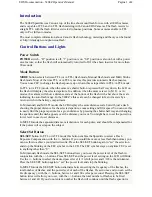
GETTING READY
42
■
Alkaline Battery Life
The actual life of alkaline batteries is affected by a variety
of factors, including the battery manufacturer, the amount
of time the batteries spend in storage before you use them,
temperature while you are recording, and photographic
conditions. As a rule, we recommend the use of
rechargeable nickel-metal hydride batteries, which have
longer lives than alkaline batteries.
• When using alkaline batteries, intermittent use of the
camera can shorten the life of the batteries.
• When using alkaline batteries, use of the camera in cold
temperatures as described below can shorten the life of
the batteries.
Example1 : Approximately 70 shots when shooting at a
temperature of 0
°
C (32
°
F).
Matsushita Battery Industrial Co., Ltd. alkaline
batteries, monitor on, zoom operation
between full wide and full telephoto every 30
seconds, during which two images are
recorded with flash; power turned off and
back on every time 10 images are recorded.
Example2 : Approximately 70 shots when shooting at a
temperature of 0
°
C (32
°
F).
MX1500 DURACELL ULTRA alkaline
batteries, monitor on, zoom operation
between full wide and full telephoto every 30
seconds, during which two images are
recorded with flash; power turned off and
back on every time 10 images are recorded.
• Note that the above number of shots is approximate and
is provided for reference only. They in no way guarantee
that you will be able to achieve a certain level of
performance under the conditions described above. The
characteristics of the alkaline batteries being used and
certain recording conditions may cause the camera to fail
to operate at temperatures of 5
°
C (41
°
F) and lower.
• The PLAY mode requires less power than the REC mode.
If you experience a problem turning on the camera in a
REC mode, try switching to the PLAY mode.
















































